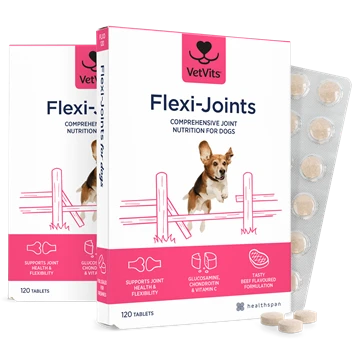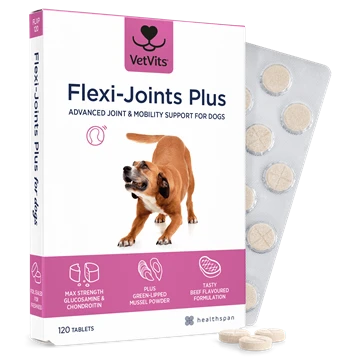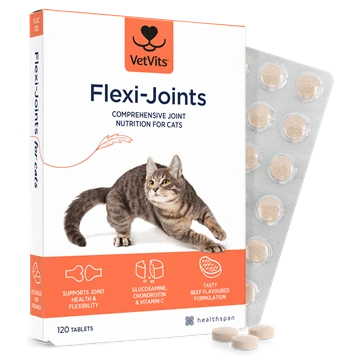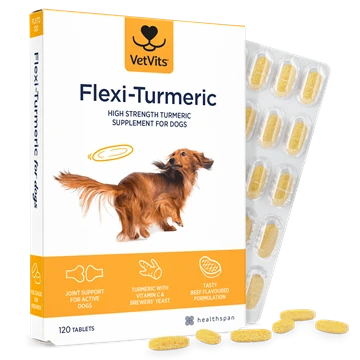As pet owners, we naturally want to provide the best care for our companions throughout their lives. Joint stiffness and mobility issues are some of the most common problems pets face, especially as they age. Of course, it can be concerning to watch your once-energetic dog hesitate before climbing stairs or notice your cat avoiding its favourite perch. Understanding the underlying causes and available solutions can help you provide the care they deserve.
🕒 6 min read
Joint health issues affect millions of pets, and recognising the early signs can significantly improve your pet's quality of life and comfort. In this guide, we’ll go over what to look out for, what might be causing those stiff joints, and some simple ways to support your pet’s mobility and keep them feeling their best.
Signs of Joint Discomfort in Pets
Our pets excel at concealing their pain, so you need to watch closely for subtle signs of joint problems. Successful management of joint issues depends on early detection, which requires careful observation of your pet's behavioural changes and movement patterns.
Common indicators of joint stiffness and mobility issues in dogs include:
- Your dog hesitates in activities that usually bring happiness, such as walking or playing.
- Stiffness and changes in walking pattern become noticeable when your pet rests.
- Your dog displays behavioural signs that include irritability along with social withdrawal.
- Your dog exhibits unusual interest in certain joints through licking and chewing those areas.
- Your dog faces problems while going upstairs, entering vehicles, or reaching elevated places.
Your cat can display joint discomfort through various symptoms that include:
- Your cat shows decreased ability to jump or climb stairs and now avoids places it used to access.
- Your cat shows modified grooming patterns, which lead to poor hygiene.
- Your cat shows hesitation during handling or displays signs of pain upon physical contact.
- Your cat has problems reaching the litter box and changes its elimination patterns.
- Your cat sleeps more and moves less.
Because these symptoms often develop gradually, it's so easy for pet owners to mistake them for normal signs of ageing. But joint discomfort isn’t just an inevitable part of getting older. The good news is, it can often be managed with the right treatment.
Understanding Joint Health and Osteoarthritis
Most pet joint problems result from osteoarthritis, which is also known as degenerative joint disease. This condition occurs when cartilage protection in joints deteriorates faster than the body's repair mechanisms can handle, leading to inflammation, pain, and reduced mobility.
Joint cartilage functions as a smooth protective surface, enabling bones to glide effortlessly against each other. This means that damage to cartilage tissue allows bones to rub against each other, which causes inflammation and painful sensations for your pet.
There are several factors that contribute to cartilage deterioration:
- Age-related changes: The ageing process of pets decreases natural cartilage production while making existing cartilage less resilient.
- Genetic predisposition: Certain breeds have a genetic predisposition to develop joint issues because of their genetic background and physical attributes. Large breed dogs including German Shepherds Labradors and Golden Retrievers have a high risk of developing hip and elbow dysplasia. The Himalayan and Persian cat breeds face elevated probabilities for joint-related health issues.
- Weight management: Excess body weight creates extra joint stress, which speeds up cartilage deterioration and boosts inflammation.
- Previous injuries: Past injuries can make pets more likely to develop arthritis in their later years, even if their original wounds healed completely.
- Developmental conditions: Joint problems caused by birth defects lead to abnormal joint mechanics in the early stages of life.
The Essential Nutrients for Dogs and Cats' Joint Health
Joint support needs specific nutrients, which help maintain cartilage and control inflammation. Knowledge about these fundamental elements lets you choose appropriate nutritional support for your furry companion.
- Glucosamine is naturally present in the body and is used to construct new cartilage tissue. However, the normal production of glucosamine in pets decreases with age, so supplementing this compound helps protect joints while supporting cartilage healing processes.
- Chondroitin sulphate pairs with glucosamine to preserve the structure and elasticity of cartilage tissues. The substance helps cartilage tissue hold moisture while protecting existing cartilage from breaking down and promoting new cartilage development.
- The natural anti-inflammatory properties of EPA (eicosapentaenoic acid) and DHA (docosahexaenoic acid) found in Omega-3 fatty acids help decrease joint inflammation and associated pain. These essential fatty acids support general health and immune system functions.
- Hyaluronic acid is an essential element of synovial fluid, which serves as a joint lubricant to enable easy joint movement. The addition of hyaluronic acid supplements helps keep joint surfaces well-lubricated to minimise friction.
- Turmeric's anti-inflammatory compounds (curcumin) offer a natural way to handle joint inflammation. Scientists have extensively researched the active turmeric component, curcumin, for its established anti-inflammatory and antioxidant effects.
Combining these nutrients helps the body naturally fix itself while sustaining optimal joint functionality. Note that the effects of joint health supplements for your pets become noticeable after several weeks of consistent use.
Management Strategies for Your Dog or Cat
Effective joint health management requires a multifaceted approach that addresses various aspects of your pet's care and lifestyle. While there is no cure for osteoarthritis, proper management can significantly improve your pet's quality of life and maintain their mobility:
Professional veterinary care is essential for proper diagnosis and treatment planning. Your veterinarian can assess your pet's needs and may recommend various treatment options, including non-steroidal anti-inflammatory drugs (NSAIDs), joint injections, physical therapy, or surgical interventions when appropriate.
Weight management is one of the most impactful interventions for pet joint health. Maintaining an optimal body weight reduces joint stress and can also slow the progression of osteoarthritis. Even modest weight reduction can provide noticeable improvements in mobility and comfort.
Exercise modification focuses on maintaining activity while avoiding high-impact movements that may exacerbate joint problems. You could also try low-impact activities such as swimming, controlled walking, and gentle play with your help, as they can maintain muscle strength and joint flexibility without placing excessive stress on affected joints.
Environmental modifications can improve your pet's daily comfort. Orthopaedic bedding provides better support during rest, while ramps and steps can help pets access elevated surfaces without jumping. Also, non-slip surfaces can reduce the risk of slips and falls that could further injure compromised joints.
Nutritional supplementation can support your pet’s joint health and can be particularly beneficial when combined with other management strategies. This is because high-quality joint supplements provide targeted nutritional support that may help maintain cartilage health and reduce inflammation.
How to Choose Joint Support Supplements for Your Pet
Always look for quality joint health supplement products with active ingredients for your precious pet. The VetVit’s range includes specialised formulations which address various pet requirements at different life stages. Here’s a quick guide to help you decide which one is right for your dog or cat:
Flexi-Joints for dogs delivers joint support through glucosamine and chondroitin while incorporating vitamins C and E for antioxidant protection. This formula works for dogs who display joint stiffness symptoms or those from breeds that tend to develop joint problems.
Flexi-Joints for Dogs
Everyday joint support | 400mg glucosamine | 75mg chondroitin | With vitamins C & E | Tasty beef flavour | Helps your dog stay active and mobile
- 400mg glucosamine and 75mg chondroitin per tablet
- With vitamins C & E to help protect joints
- Supports mobility and long-term joint health
Flexi-Joints Plus for dogs includes elevated levels of glucosamine and chondroitin, together with Green-Lipped Mussels, a natural source of omega-3 fatty acids and extra beneficial compounds. This advanced formula is particularly appropriate for dogs with established joint issues or those requiring more intensive support.
Flexi−Joints Plus for Dogs
Advanced joint support for dogs | 500mg glucosamine and 100mg chondroitin | High-strength formula with green-lipped mussel & vitamins | Ideal for older or less mobile dogs
- High-strength joint care with 500mg glucosamine and 100mg chondroitin
- Enriched with green-lipped mussel for natural anti-inflammatory support
- Ideal for ageing, large, or less active dogs
Flexi-Joints for cats is specifically formulated for feline physiology and provides targeted joint support with high-strength glucosamine and chondroitin in a form that's appropriate for cats' unique nutritional needs.
Flexi−Joints for Cats
Joint support for cats | Glucosamine & chondroitin | With vitamins C and E | Tasty beef flavour
- Formulated for feline joint health and mobility
- Includes glucosamine, chondroitin, and antioxidant vitamins
- Beef-flavoured for fuss-free daily support
Flexi-Turmeric for dogs can be used alongside joint supplements to provide additional anti-inflammatory support. The natural compounds in turmeric may help manage inflammation and support overall joint comfort.
Flexi−Turmeric for Dogs
High strength turmeric for dogs | Joint support for active dogs | Added vitamin C and brewer's yeast | Easy to crumble into your dog's food | Tasty beef flavour
- High-strength turmeric blend for active dogs
- With vitamin C and brewer’s yeast for added support
- Easy to crumble into food — beef flavour for fuss-free feeding
Your pet's overall health relies heavily on their joint health. For pet owners, acting early will produce substantial benefits for pet mobility and comfort throughout their lives. You can help your pet keep an active and comfortable lifestyle by recognising joint discomfort indicators and using proper management strategies along with targeted nutritional support.
Pets differ from each other, so the most effective approach will depend on their distinct needs, age, and health condition. Your veterinarian will help you create the best joint health support plan through regular check-ups while you observe your pet's behaviour and ability to move.
Many pets who receive proper management and support can lead active, comfortable lives throughout their senior years. The key is taking action early and maintaining a consistent, comprehensive approach to joint health care.
Support your dog’s health and boost your cat’s wellness with VetVit’s premium dog supplements and cat supplements. Shop our full range of high-quality pet products for optimal nutrition today.




